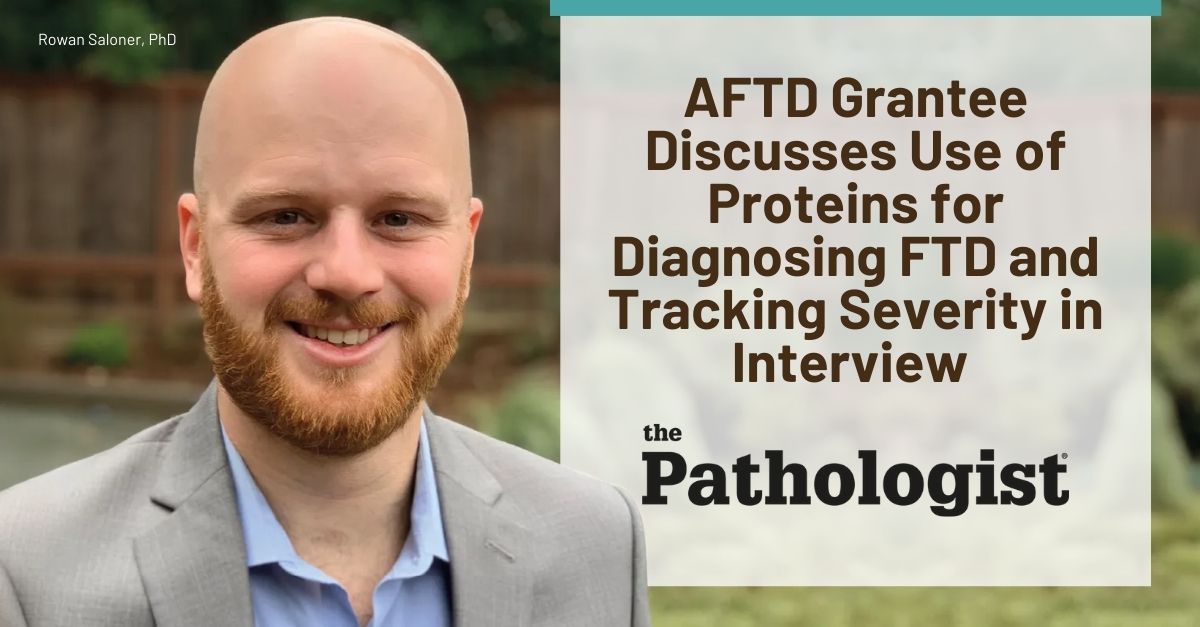Rowan Saloner, PhD, recipient of AFTD’s 2024 Clinical Research Training Scholarship in FTD, discusses how measuring protein levels in cerebrospinal fluid (CSF) can help diagnose FTD in a recent interview with The Pathologist. Dr. Saloner highlights the results of a recent study he led that showed that levels of specific proteins could potentially be used to track the severity of FTD.
CSF Proteins Offer “Real-Time” View into Effects of FTD on Brain
As Dr. Saloner notes, FTD is difficult to diagnose, partly due to the current lack of approved biomarkers specific to the disease. While genetic testing can reveal the presence of risk genes, which can provide insight into the cause of the disease, only some FTD cases have a known genetic cause. However, scientists have found that levels of proteins associated with various brain functions are altered in FTD, with the changes being detectable in CSF samples.
“Clinical symptoms and neuroimaging can tell us which neurocircuits are affected in a given FTD patient, but they don’t provide information at the molecular level – whether misfolded tau, TDP-43, or another protein is driving the disease,” Dr. Saloner explains. “CSF offers a unique ‘real-time’ window into brain biology because it bathes the brain and spinal cord, making it a rich source of molecular information about neurodegeneration.”
Dr. Saloner noted how analyzing protein levels in CSF allows scientists to review levels of thousands of proteins simultaneously, providing a broad snapshot of FTD’s effects. By highlighting where FTD is causing dysfunction and neurodegeneration, the information revealed by these proteins could guide drug development.
Proteins May Be Able to Assist in Diagnosis and Monitoring for Non-Genetic FTD
In their study, Dr. Saloner and his colleagues discovered groups of proteins whose levels change together. The proteins were associated with various brain functions, including immune system activation, RNA processing, and maintaining brain cell health. Changes in the levels of these protein groups were related to the severity of FTD, with the findings confirmed by results from memory tests, brain scans, and symptoms.
“These protein ‘signatures’ give us a real-time view of what’s going wrong in the brain and could help create future biomarkers,” said Dr. Saloner. “Interestingly, we saw similar patterns in people with non-genetic (sporadic) FTD, meaning the findings may apply broadly.”
A crucial discovery that Dr. Saloner highlighted was that the protein changes can begin years before the onset of symptoms.
“For instance, proteins tied to RNA and brain cell function were abnormal even in people who had FTD-related gene mutations but no symptoms yet,” Dr. Saloner explains. “Some of these proteins could even predict future memory decline. This means molecular changes might start years before symptoms, offering a way to track early disease or develop treatments to delay it.”
Validation and Further Work Required Before Proteins Can Be Used as Biomarkers
While the study’s results are promising, Dr. Saloner noted that more work will be required to validate these proteins as FTD biomarkers and find ways to use them in routine clinical practice. Additionally, the tools (known as “assays”) used to discover these proteins are not readily accessible to clinicians and are challenging to scale up outside a laboratory setting.
“In practice, single-target assays or small multiplex panels that measure a select set of validated biomarkers will be the most feasible and scalable tools for diagnostic use,” Dr. Saloner said. “A major priority of our work is developing targeted assays based on these unbiased results, particularly for use in sporadic FTD, where genetic screening is not informative.”
Dr. Saloner notes that collaboration will also be necessary to validate the proteins as biomarkers. Dr. Saloner and his colleagues are working with the large-scale ALLFTD study, which operates at 30 sites across North America. ALLFTD is also a member of the Global Neurodegeneration Proteomics Consortium, which brings together data from FTD and other dementias to develop protein-based diagnostic tools, further expanding the researchers’ access to usable data.
As biomarkers are verified, it will be essential to translate CSF biomarkers into blood-based biomarkers. As Dr. Saloner notes, blood-based tests are easier to administer at clinics.
Dr. Saloner’s work was supported by the Clinical Research Training Scholarship in FTD, funded by the Holloway Family Fund and the American Brain Foundation, in collaboration with the American Academy of Neurology.
Getting an FTD diagnosis can be an arduous process, but AFTD can help. Our Find Support Near You tool can help you locate a medical center specializing in FTD closest to you. Additionally, AFTD’s HelpLine is always available to answer any diagnostic questions you may have. You can contact the HelpLine at 1-866-507-7222 or info@theaftd.org.

